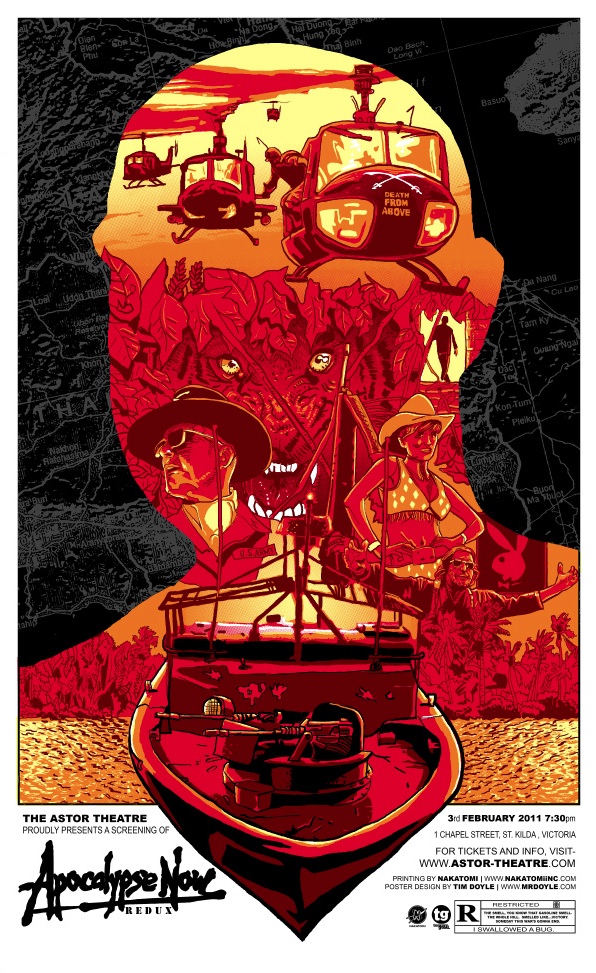
Apocalypse Now (USA: Francis Ford Coppola, 1979: 153/203 mins)
"Apocalypse Now." Sparknotes (2004)
The Apocalypse Now Issue Little White Lies #35 (2011)
Bahr, Fax, et al. "Apocalypse Now." The Projection Booth #274 (June 7, 2016)
Bond, Lewis. "Apocalypse Now: Analysis, Part 1." (Posted on Youtube: April 5, 2015)
---. "Apocalypse Now: Analysis, Part 2." (Posted on Youtube: April 14, 2015)
Ebert, Roger. "Apocalypse Now." Chicago Sun-times (November 28, 1999)
"Francis Ford Coppola's Apocalypse Now Must Be the Key Lecture in Anyone's Filmmaking Education." Cinephilia and Beyond (No Date)
Herr, Michael. Dispatches. NY: Vintage International, 1991. [Your professor has a copy.]
"The Holy Grail of Workprints: The Five-Hour Rough Version of Apocalypse Now." Cinephilia and Beyond (June 7, 2016)
"The Importance of Depth of Frame." imgur (September 2013)
Insdorf, Annette. Cinematic Overtures: How to Read Opening Scenes. Columbia University Press, 2017. ["Your professor has a copy of this book."]
Kuersten, Erich. "The Primal Father (CinemArchetypes #8)." Acidemic (March 19, 2012)
Laity, Adam. "The Role of Landscape, Nature and Environment in War Films." (Posted on Vimeo: 2012)
Leotta, Alfio. "'I love the smell of napalm in the morning': Violence and nostalgia in the cinema of John Milius." Jump Cut #57 (Fall 2016)
LoBrutto, Vincent. "Tableau Narrative Structure and Sound Design: Apocalypse Now." Becoming Film Literate: The Art and Craft of Motion Pictures. Westport, CT: Praeger, 2005: 14-19. [BCTC Library: PN1994 L595 2005]
Martin, Adrian. "The Misleading Man: Dennis Hopper." Film International 5.1 (2007). [Professor has copy for students]
"The New Cinema: A Fascinating Documentary On the Restructuring of 1960's Hollywood." Cinephilia and Beyond (ND)
Norris, Margaret. Writing War in the Twentieth Century. Charlottesville, VA: University of Virginia, 2000. [Available in BCTC Library: PN56 W3 N67 2000]
Rich, B. Ruby. "Apocalypse Now Coppola's American way." Jump Cut #23 (October 1980)
San, Miyagi. "Movie Analysis: The Aspect of Conflict in Apocalypse Now." Entertainment Scene 360 (September 30, 2007)
Srivastava, Swati. "Apocalypse Now: Movie Research and Analysis." Fasten Up Your Seat Belts (No Date)
Tavoularis, Alex. "Napalm in the Morning." DGA Quarterly (Spring 2013)
Turse, Nick. "Kill Anything That Moves": New Book Exposes Hidden Crimes of the War Kerry, Hagel Fought in Vietnam." Democracy Now (January 15, 2013)
Wasson, Steve. "What Really Went on Between Francis Ford Coppola and Martin Sheen During the Filming of Apocalypse Now?" Literary Hub (November 28, 2023) ["The Disturbing—and Revealing—Story Behind an Iconic Moment in Cinema History."]
More than 40 years on from the release of Apocalypse Now, the opening sequence still leaves an unshakeable sense of dread. The film casts an immediate spell, and 'The End' is its incantation. The song’s delirious vocals and shadowy, brooding psychedelic instrumentals are eerily apt accompaniments to the visions of warfare that unfold onscreen. As Captain Willard’s head swims with napalm and choppers, The Doors invite you to join him in the darkness.
Although inspired by Joseph Conrad’s 1899 novella Heart of Darkness, director Francis Ford Coppola had quite a different world to work with. Instead of European empires and the Congo, Apocalypse Now deals in America and the Vietnam War. 'The End' also nods to the wider tumult back in the States at the time — to a counterculture learning to question its government’s virtue at home and abroad. The song’s gothic despair sets the scene for the horrors to come. It’s the perfect overture for an all-American nightmare. – Frederick O'Brien
No comments:
Post a Comment